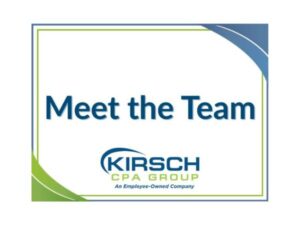Recruit and Retain Good Employees with Benefit Programs
Kirsch CPA Group
Feb 17, 2017

It’s a lot more efficient to retain good employees than to find and hire new ones. The Society for Human Resource Management (SHRM) recently asked its members how they are adapting their employee benefit programs to avoid losing quality workers.
SHRM’s “Strategic Benefits” study set the stage by asking employers how many are having a tough time retaining highly skilled employees. 37% reported that retaining employees is a problem for them — up from 27% only four years ago. That challenge was more prevalent among “high-tech” companies.
Nearly one in five surveyed employers changed their benefits plans within the last year. And among high-tech companies, one in four did so.
How many companies have changed these benefits in the past year?
| Employee Segment | |||
| Benefit category | All | High performing | Highly skilled |
| Health care benefits | 61% | 44% | 44% |
| Flexible working arrangements | 37% | 31% | 35% |
| Retirement savings plans | 35% | 25% | 27% |
| Leave benefits | 34% | 27% | 28% |
| Career development | 34% | 36% | 34% |
| Wellness | 26% | 23% | 23% |
| Family-friendly benefits | 14% | 10% | 10% |
Source: SHRM 2016 Strategic Benefits Survey
What did employers change? As the table above indicates, among the employers that made changes, health care benefits were altered by the majority.
Employee Segment Targeting
As the table shows, 44% of the employers made changes particular to high-performing and highly skilled workers. That finding was consistent with a widely held view that professional and career development benefits are becoming more critical to employee retention. Slightly smaller majorities of respondents also believe that flexible working benefits, health care benefits, retirement savings plans and wellness programs will become more important.
Family-friendly benefits are seen to be dropping in importance, with only 28% believing they will grow in value (vs. 55% 2013).
When asked which benefits will be more critical to helping employers retain high-performing employees, respondents overwhelmingly identified career development (70%), and slightly smaller majorities named health care benefits, retirement plans and flexible working arrangements.
Millennial Priorities
Career development and flexible working arrangements were also considered vital to the retention of millennial generation workers, with over 80% of survey respondents identifying those benefits.
The SHRM survey asked employers the same set of questions with respect to recruiting new workers. Their responses generally fell into the same pattern.
One noteworthy finding, however, is that employers see the primary bread-and-butter benefits — health and retirement plans — gaining importance in the recruitment of employees at all levels of the organization, but career development and flexible working arrangements as becoming a larger draw for millennial and highly skilled employees.
The survey did not get “into the weeds” on the kinds of changes survey respondents made to their plans. The general trend with health plan changes in recent years has been a shift to high-deductible health plans (HDHPs) paired with health savings accounts.
Relative Competitiveness
Employers who consider health benefits as a vital tool for retaining and recruiting employees need to only make their plans less costly to employees than their competitors do.
Expanding flexible working arrangements, in contrast, doesn’t necessarily entail an increase in employer costs. Similarly, career development benefits, which are so cherished by millennials (as are flexible working arrangements) don’t need to add significant costs to your employee “total compensation” budget.
Making an effort to sketch out a probable career path for talented employees may not cost anything. And while additional training programs do increase costs, if the net result is better trained and more loyal employees, that expense becomes a long-term investment in the future of your organization.
More Resources

About The Author
Kirsch CPA Group is a full service CPA and business advisory firm helping businesses and organizations with accounting,…
Sign Up for Email Updates
Tags
Accounting & Financial News

1099 Rules Changes for Businesses
The One Big Beautiful Bill Act (OBBBA) eased the rules in 2026 for Form 1099-NEC, "Nonemployee Compensation,"…




